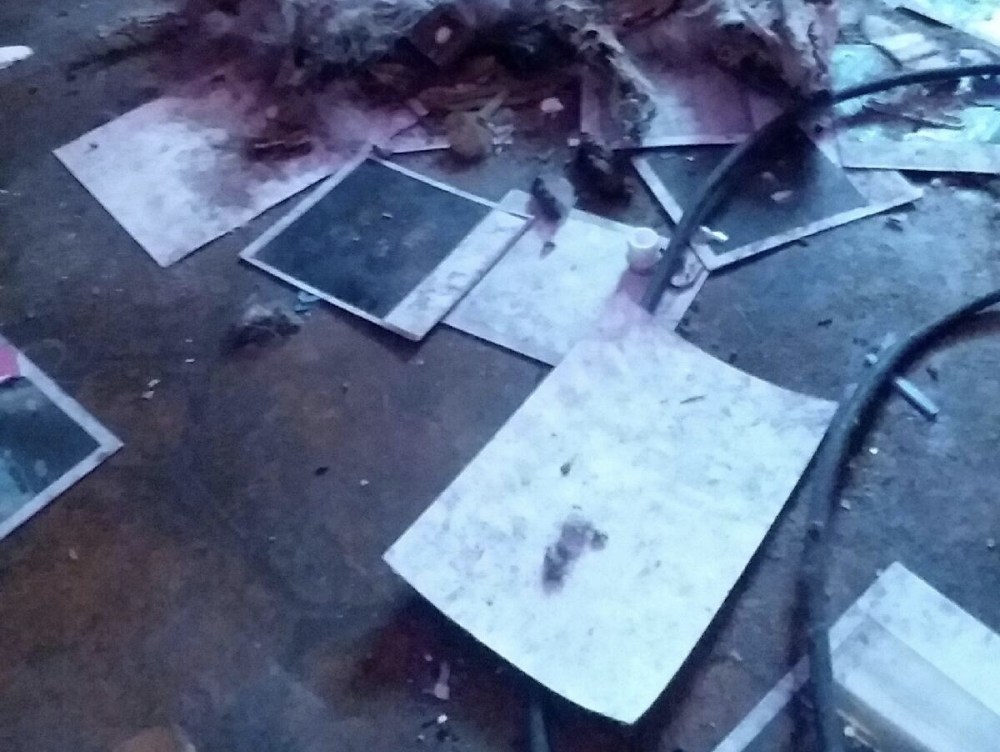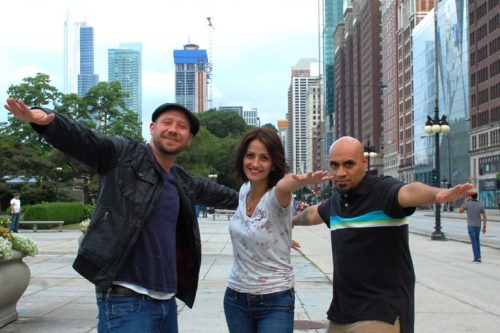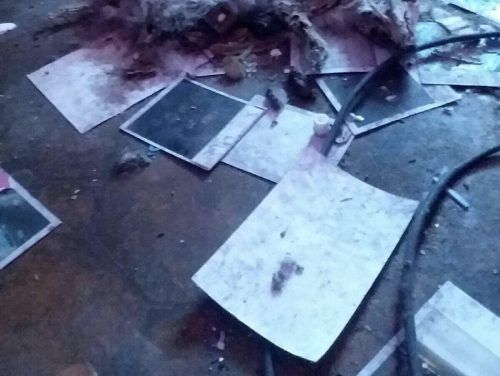
Coordenadas – A Literary Journal at the Intersection of the Right Time and the Right Place
Following is a condensed version of my conversation with Samuel.
Andrew Gregory Krzak: What are your main duties there, and who else is on staff?

The Amazing Coordenadas Staff. Photo by Leo Hernandez.
Samuel DuBois: We have three staff members: Alma Campos, Leo Hernandez, and myself. We work with many different writers and photographers. I work in story outreach and I contact people who would be interested in telling or writing a story. Then, I work with them to develop their stories. For the first issue, I reached out writers like Fofana from Togo, Mahmoud Saeed from Iraq, and Daisy Carol from Ecuador. I’m editing the pieces and working with the authors on the changes. In addition, I travel with Leo Hernandez through the southeast side of Chicago and Northwest Indiana. Our photojournalism work is called North America, and Leo’s primary photos published in Coordenadas came from this project. Leo heads the photography department and assists in editing and selections. Alma heads the journalism department; see her article called “Dias in Juarez”. The three of us often collaborate on projects, making editorial choices and construct the themes. For instance, I’m working with Leo on an investigation of immigrant youth detention centers in Chicago’s neighborhoods and in the rural areas of Illinois. Alma is working with Leo on a journalistic project focusing on single mothers and housing. Leo is working with author Gustavo Rueda on photo stories about Chicago bridges.
AGK: What was your inspiration for starting the magazine and how have your experiences at Columbia College Chicago been integral to your process?
SD: My inspiration started with the deaths of two of my friends and conversations with friends on how to continue honoring their spirits. Then there was the 2016 election. In response to it, we started an online group to highlight positive contributions of immigrants and refugees. On the website, Alma writes that Coordenadas was born out of resistance. We started with a Facebook conversation in January 2017 when Donald Trump announced his intent to publish a weekly list of criminal actions committed by immigrants. These lists demonized the vast majority of immigrants and refugees, who are law-abiding individuals. To counter the racist rhetoric, we asked family and friends for positive notifications. Initially using Facebook and a simple website, we gathered lists and published them as well. But there was more to be said, and the three of us created Coordenadas as a digital space where that more is said.
At Columbia, under the direction of Dr. Jenny Boully, I took an independent study where I focused on immigrant and refugee stories. This opportunity inspired me. I kept working hard, and during this time, I interviewed fifty people, listened to their stories and assisted them in their writing. During this time, I learned the skills necessary to make Coordenadas a success.
AGK: You publish work in multiple languages; what’s behind that decision?
SD: The decision to publish work in multiple languages came from the work itself. Gustavo Rueda, from Mexico City, who has lived in Chicago for twenty years and is a bilingual Spanish/English author, wrote a spectacular essay called Crossover. Rueda addresses language, culture, and experiences. We decided to publish it in Spanish and not translate it or ask Rueda for an English version. It was a hard choice, but we felt that work was so strong that it would be effective without translation. With Mahmoud Saeed, we published his preface to “The World through the Eyes of Angels”. In this essay, where the settings are in Mosul, Chicago, and Tijuana, he explores the reasons he writes. This essay was translated from Arabic to English. And because Coordenadas focuses is on the cross-sections of international stories, art, and photography, publishing work in its original language is important.

The things of us, on the floor. Photo by Leo Hernandez
AGK: Which Columbia professors have you found the most helpful during your time here?
SD: Overall, the entire faulty at Columbia facilitated and supported the challenging work where I had to examine fiction and nonfiction. I had to ask myself, why do I write? Why do I read fiction and nonfiction? What is it about writing and reading that is magic? What is it about writing and reading that can create pathways of understanding and new ways of confronting the realities and injustices we face in 2018? Each professor has their specialties and the faculty, as a whole, gave me many theories, methods, examples, and a whole host of readings that had strengthen my approach to writing and opened my eyes to many different approaches and styles.
AGK: What else would you like to tell us?
SD: Coordenadas has a five-year plan that includes journalism, fiction, non-fiction, poetry, and photography. We will travel and build networks with other writers and photographers across many coordinates—the cities and towns of the world. In the next issue, we will publish 15 stories from people from every continent, and we will have our long form, photojournalism, and photography selections published online.
***
The Coordenadas website is coordenadas.us.
